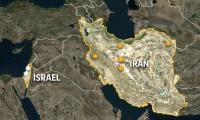Protests in Egypt
During the G7 summit in France recently, when President Trump, looking for Egyptian President Abdel Fattah el-Sisi, called out ‘Where’s my favourite dictator’ everyone seemed stunned, reported the Wall Street Journal.
Trump’s favourite dictator is now facing public protests in many Egyptian cities. Thousands of protesters have been arrested. The detained know it’s just the beginning and that great movements start from small protests.
Recall the Arab Spring 2010 onwards that began with a series of skirmishes and small-scale protests until it evolved into a revolution that resulted in the overthrow of deeply entrenched dictators in Tunisia and Egypt.
The ongoing unrest in various Egyptian cities began on the instigation of a former military contractor, Mohamed Ali, who has been constantly campaigning against the Sisi regime by uploading videos on the social media. Living in self-exile in Paris, he has kept the public informed about Sisi and his family’s alleged corruption and squandering public money on building palaces.
Surprisingly, the regime instead of denying the allegations seemed to confirm them. President Sisi in an urgently arranged Youth Conference responded to the allegations: “Yes, I have built presidential palaces, and will continue to do so” reported the Aljazeera Network.
Public anger over high spending by the president and the military on construction of palaces, including a 7-star hotel in a non-tourist area is but natural. Especially, when one-third of Egyptian population reportedly lives on less than $1.50 a day. How such a large segment of population meets its health and education requirements is anybody’s guess. Because of the sharp disparity between the privileged and the underprivileged, reminiscent of the French Revolution, the suffering public is forced to react and, in return, face ruthless treatment by the state.
Since large-scale arrests have to be made, there must exist an extensive network of prisons. At the time Sisi came to power the prison population is reported to have been 62,000. In the last few years of Sisi’s rule, the incarcerated have increased in number. Some disappeared altogether. A strange rule of Egyptian prisons is that the jail authorities are absolved of the responsibility of providing food to the prisoners. Prisoners’ families have to manage the provisions. So the state is generous in keeping prisoners as long as it wishes in most inhuman conditions. Some die because of overcrowding.
When the recent protests raged in Egypt, President Trump hearing about it commented: “Egypt has a great leader; he’s highly respected. He’s brought order, before he was here {in power} there was very little order – there was chaos – and so I am not worried about that {protests} at all.” So much for Trump’s regard for public opinion.
Nevertheless, Egypt for all practical purposes is typically a military state with a wafer-thin dressing of democracy. To understand how the state functions, it’s instructive to read ‘Militarising The Nation’ by Zeinab Abul-Magd. The first few lines of the introduction explain it all: “Upon the graduation of new cadets in the summer of 2015, the director of the Egyptian war college proudly asserted that these young officers were the country’s future leaders…the ministers, governors, ambassadors, presidents and managers.”
While President Sisi and his coercive state apparatus come down heavy on the protesters, who knows how many generals and air marshals wait in the wings to replace him. If President Sisi could bag 97 percent votes in two elections so could any of them on getting an opportunity.
The writer is a freelance columnist based in Lahore.
Email: pinecity@gmail.com
-
 AI Safety Battle: Anthropic Fires Back At Pentagon After US Military Flags It ‘supply Chain Risk’
AI Safety Battle: Anthropic Fires Back At Pentagon After US Military Flags It ‘supply Chain Risk’ -
 OKC Vs Nuggets: NBA MVP Shai Gilgeous-Alexander Scores 36 In Fiery Overtime Win
OKC Vs Nuggets: NBA MVP Shai Gilgeous-Alexander Scores 36 In Fiery Overtime Win -
 Eric Dane's Biggest Regret Comes To Light Following Days Of His Death
Eric Dane's Biggest Regret Comes To Light Following Days Of His Death -
 Israel Launches Attack On Iran's Capital And Declares State Of Emergency
Israel Launches Attack On Iran's Capital And Declares State Of Emergency -
 At Least 15 Dead After Military Plane Carrying New Banknotes Plunges Out Of Control In Bolivia
At Least 15 Dead After Military Plane Carrying New Banknotes Plunges Out Of Control In Bolivia -
 OpenAI Partners With Pentagon After Trump Bans Anthropic AI
OpenAI Partners With Pentagon After Trump Bans Anthropic AI -
 Trump Orders Federal Agencies To Stop Using Anthropic AI Tools
Trump Orders Federal Agencies To Stop Using Anthropic AI Tools -
 Shocking Details Emerge In Martin Short’s Daughter Katherine's Death Investigation: 'Kept To Herself'
Shocking Details Emerge In Martin Short’s Daughter Katherine's Death Investigation: 'Kept To Herself' -
 Daniel Serafini Gets Life Without Parole In In-laws Murder And Attempted Murder Case
Daniel Serafini Gets Life Without Parole In In-laws Murder And Attempted Murder Case -
 Yerin Ha On Stepping Into The Spotlight In Bridgerton Season Four
Yerin Ha On Stepping Into The Spotlight In Bridgerton Season Four -
 Nakiska Ski Area Avalanche Leaves Youth Unresponsive, Second Skier Escapes Unhurt
Nakiska Ski Area Avalanche Leaves Youth Unresponsive, Second Skier Escapes Unhurt -
 Igor Komarov Missing In Bali: Seven Foreign Suspects Arrested In Kidnapping Probe
Igor Komarov Missing In Bali: Seven Foreign Suspects Arrested In Kidnapping Probe -
 'I Swear' Director Kirk Jones Says Bafta Broadcast Mishap Failed Tourette’s Advocate
'I Swear' Director Kirk Jones Says Bafta Broadcast Mishap Failed Tourette’s Advocate -
 Yogurt Shop Murders Solved: 1991 Austin Cold Case Finally Linked To Serial Killer
Yogurt Shop Murders Solved: 1991 Austin Cold Case Finally Linked To Serial Killer -
 Iran Tensions Rise As Trump Says He Is 'not Thrilled' With Nuclear Negotiations
Iran Tensions Rise As Trump Says He Is 'not Thrilled' With Nuclear Negotiations -
 Where Is Calvin Klein's Wife Kelly Klein Now After Divorce And Fashion Fame?
Where Is Calvin Klein's Wife Kelly Klein Now After Divorce And Fashion Fame?



